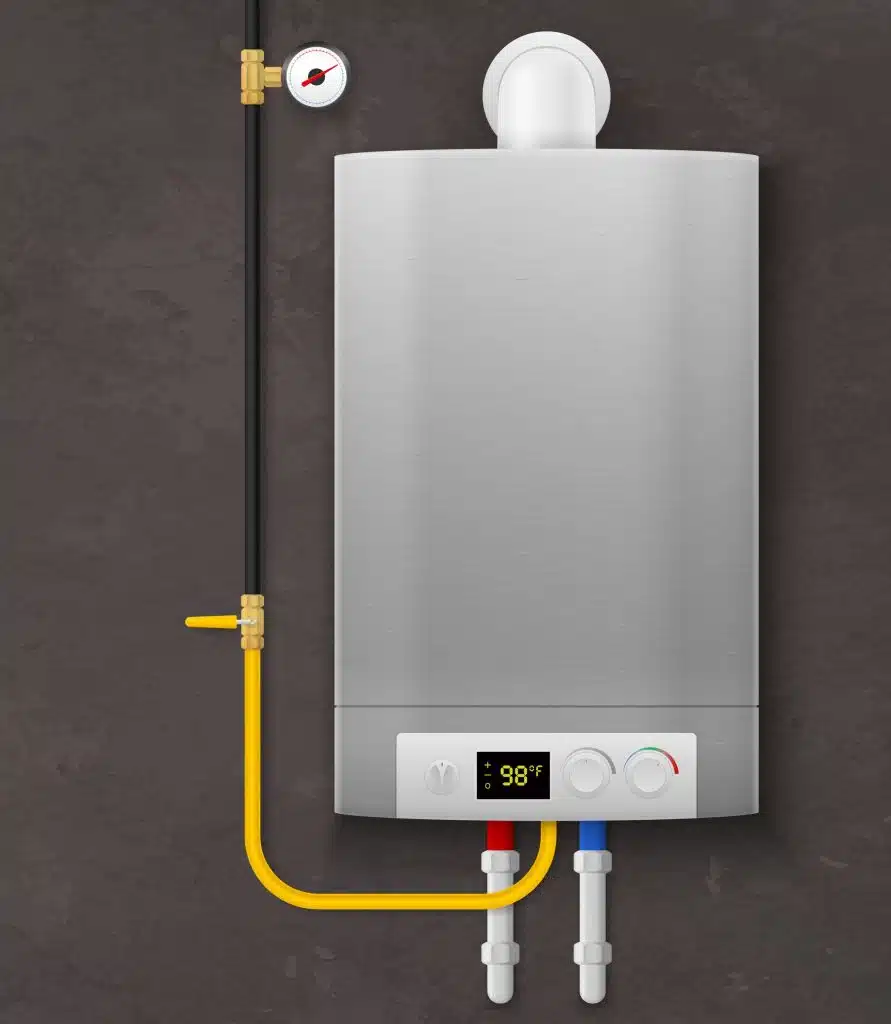Tankless non-condensing water heaters: efficient, endless hot water, space-saving for homes & businesses.
Photo from iStock – Credit: Macrovector
What Are Tankless Non-Condensing Water Heaters?
Are you considering upgrading to a more efficient water heating system?
Tankless non-condensing water heaters could be the solution you need.
These innovative units heat water on demand, meaning they provide hot water only when you need it.
This is a significant shift from traditional tank water heaters, which continuously heat and store water, often leading to higher energy consumption and costs.
Unlike their condensing counterparts, non-condensing tankless water heaters feature a single heat exchanger.
This design simplifies the heating process by directly heating the water as it passes through the unit.
When you turn on a hot water tap, cold water travels through the heat exchanger, gets heated by the gas burner, and is delivered hot to your faucet almost instantly.
Benefits of Tankless Non-Condensing Water Heaters
Energy Efficiency: Non-condensing tankless water heaters are known for their high efficiency. They typically have a Uniform Energy Factor (UEF) of around 0.81, which is considerably higher than traditional tank water heaters.
Endless Hot Water: Since these heaters warm water on demand, you’ll never run out of hot water, no matter how many showers or loads of laundry you need to do simultaneously.
Space-Saving Design: These units are much smaller than traditional tank water heaters, making them perfect for homes with limited space.
Environmentally Friendly: By reducing energy consumption, tankless water heaters contribute to lower greenhouse gas emissions, making them a greener choice for your home.
Lower Utility Bills: Over time, the efficiency of tankless non-condensing water heaters can lead to significant savings on your energy bills. Although the initial investment might be higher, the long-term savings make it a cost-effective solution.
How Tankless Non-Condensing Water Heaters Work
The Heating Process
Understanding how tankless non-condensing water heaters work can help you appreciate their efficiency and benefits.
Unlike traditional water heaters that store and continuously heat water in a tank, tankless models heat water on demand. Here’s a step-by-step breakdown of the heating process:
Detection of Water Flow: When you open a hot water tap, the tankless water heater detects the flow of cold water entering the unit.
Activation of Flow Sensor: The flow sensor activates, determining the amount of hot water needed based on the flow rate.
Ignition: The igniter activates, starting the gas burner.
Heating Process: Cold water passes through a heat exchanger, where it is heated by the gas burner to the desired temperature.
Hot Water Delivery: The heated water is then delivered to your tap, providing an instant supply of hot water.
The simplicity of this process is a key advantage of non-condensing tankless water heaters.
By heating water only when needed, these units eliminate the energy losses associated with maintaining a tank of hot water, leading to significant energy savings.
Installation Requirements
Installing a tankless non-condensing water heater involves several considerations to ensure optimal performance and safety:
- Venting and Exhaust: Non-condensing models produce exhaust gases at higher temperatures than condensing models. Therefore, they require heat-resistant, corrosion-resistant metal venting materials. Proper venting is crucial to safely expel these gases from your home.
- Space and Placement: These heaters are compact and can be installed in various locations, including closets, basements, and even on exterior walls. This flexibility makes them suitable for homes with limited space.
- Professional Installation: Due to the complexity of venting and gas connections, professional installation is recommended. A certified installer will ensure that the unit is correctly set up, maximizing its efficiency and lifespan.
By following these installation guidelines, you can ensure that your tankless non-condensing water heater operates safely and efficiently, providing reliable hot water whenever you need it.
Photo from iStock – Credit: PeopleImages
Benefits of Choosing Tankless Non-Condensing Water Heaters
Cost Efficiency
One of the most compelling reasons to choose tankless non-condensing water heaters is their cost efficiency.
Although the initial investment for these units can be higher than for traditional tank water heaters, the long-term savings are significant. Here’s why:
Energy Savings: Tankless water heaters eliminate the need to keep a large tank of water continuously heated. Instead, they heat water only when needed, which drastically reduces energy consumption. Non-condensing models, like those in Navien’s NHW-A series, are highly efficient, boasting a Uniform Energy Factor (UEF) of around 0.81. This efficiency translates to lower energy bills over time.
Lower Operational Costs: Because they are more efficient, tankless non-condensing water heaters also have lower operational costs compared to traditional tank heaters. They reduce standby heat loss, which is the energy wasted by keeping water hot even when it’s not being used.
Reduced Water Heating Costs: On-demand heating ensures that you’re not wasting energy heating water that you’re not using. This is particularly beneficial for households with varying hot water needs. Over time, the savings on utility bills can offset the initial cost of the unit and installation.
Maintenance and Longevity
Maintenance is a crucial aspect of any home appliance, and tankless non-condensing water heaters are no exception.
However, they tend to be easier and less costly to maintain compared to their condensing counterparts and traditional tank models.
Minimal Maintenance Requirements: Non-condensing units typically require less maintenance because they do not have a secondary heat exchanger, which is a component that often needs regular cleaning and upkeep in condensing models. The simpler design of non-condensing units means fewer parts to service and maintain.
Longevity: Tankless water heaters generally have a longer lifespan than traditional tank models. A well-maintained tankless water heater can last up to 20 years or more, whereas traditional tank water heaters typically last around 10-15 years. This longevity further enhances the cost-effectiveness of tankless systems.
Durability: High-quality materials and advanced engineering contribute to the durability of tankless non-condensing water heaters. For example, Navien’s NHW-A series is known for its robust construction and reliable performance, ensuring that homeowners can depend on their water heaters for years to come.
By choosing a tankless non-condensing water heater, you not only benefit from reduced energy costs and operational savings but also enjoy the advantages of a durable and low-maintenance system that provides consistent and reliable hot water.
Common Applications and Use Cases
Residential Use
Tankless non-condensing water heaters are an excellent choice for residential applications due to their efficiency, space-saving design, and reliability.
Here’s why they are particularly suited for home use:
Flexibility in Installation: These units can be installed in various locations around the house, including closets, basements, and even on exterior walls. Their compact size makes them ideal for homes with limited space, offering flexibility that traditional tank water heaters cannot match.
Endless Hot Water Supply: For households with high hot water demand, such as large families or homes with multiple bathrooms, tankless water heaters provide a continuous supply of hot water. This means no more waiting for a tank to refill between showers, laundry, and dishwashing.
Energy Efficiency: Homeowners in areas like Oak Lawn, Flower Mound, Carrollton, and Coppell can significantly reduce their energy bills by switching to a tankless non-condensing water heater. The efficiency of these units ensures that you’re only heating water when you need it, which can lead to substantial savings over time.
Commercial Use
Tankless non-condensing water heaters are not only beneficial for residential properties but also for commercial settings.
Businesses that require a consistent and reliable hot water supply can greatly benefit from these systems.
Restaurants and Cafes: In food service establishments, the need for hot water is constant and high. Tankless water heaters ensure that there is always hot water available for cooking, cleaning, and sanitation without the downtime associated with traditional tanks.
Hotels and Motels: For accommodations, having an uninterrupted supply of hot water is crucial for guest satisfaction. Tankless non-condensing water heaters can meet the high demand during peak times, such as mornings when multiple guests are showering simultaneously.
Gyms and Spas: Facilities that offer showers and spa services need a reliable hot water source. Tankless systems can handle the varying demands efficiently, ensuring that clients have a comfortable experience without interruptions.
Comparison with Other Water Heating Systems
Traditional Tank Water Heaters
Traditional tank water heaters have been the standard in many homes for decades.
Here’s how they compare to tankless non-condensing water heaters:
Energy Efficiency: Traditional tank water heaters continuously heat and store a large volume of water, leading to significant energy loss through standby heat. In contrast, tankless non-condensing water heaters heat water on demand, which eliminates standby heat loss and results in higher energy efficiency.
Space Requirements: Traditional tank models are bulky and require significant space for installation. Tankless models are compact and can be mounted on walls, freeing up valuable floor space.
Cost: While the initial purchase price of a traditional tank water heater is typically lower, the long-term operational costs are higher due to lower efficiency and more frequent replacements. Tankless models have a higher upfront cost but offer lower energy bills and a longer lifespan, making them more cost-effective in the long run.
Hot Water Supply: Traditional tank heaters can run out of hot water during peak usage, requiring a waiting period for the tank to reheat. Tankless models provide a continuous supply of hot water, making them ideal for households with high demand.
Condensing Tankless Water Heaters
Condensing tankless water heaters are another modern alternative to traditional tank models.
Here’s how they stack up against non-condensing tankless water heaters:
Efficiency: Condensing models are more efficient than non-condensing ones due to the presence of a secondary heat exchanger that captures and recycles heat from the exhaust gases. This additional heat transfer step improves their overall efficiency, often reaching up to 0.96 UEF compared to the 0.81 UEF of non-condensing models.
Venting: Condensing units can use less expensive PVC venting materials because the exhaust gases are cooler, thanks to the secondary heat exchanger. Non-condensing models require metal venting that can withstand higher temperatures, which can increase installation costs.
Cost: Condensing tankless water heaters generally have a higher initial cost due to the additional components required for their secondary heat exchange system. However, the increased efficiency can result in greater energy savings over time, potentially offsetting the higher upfront expense.
Maintenance: Condensing units require more frequent maintenance to keep the secondary heat exchanger clean and functioning properly. Non-condensing units, with their simpler design, typically require less maintenance, making them easier and cheaper to maintain over their lifespan.
By comparing these different types of water heaters, homeowners can make an informed decision that best fits their needs, budget, and space constraints.
Both condensing and non-condensing tankless water heaters offer significant advantages over traditional tank models, particularly in terms of energy efficiency and space savings.
Choosing the Right Tankless Water Heater for Your Needs
Factors to Consider
Selecting the right tankless non-condensing water heater involves considering various factors to ensure it meets your specific needs:
Home Size and Water Usage: The size of your home and the number of occupants significantly influence your hot water needs. Larger homes or households with multiple bathrooms may require a higher capacity unit to ensure consistent hot water supply during peak usage times.
Climate and Location: The ambient temperature of the incoming water can affect the efficiency of your tankless water heater. In colder climates, the incoming water is colder, requiring more energy to heat it to the desired temperature. Therefore, homeowners in regions with colder climates should consider models designed to handle lower incoming water temperatures efficiently.
Budget and Long-Term Savings: While the initial cost of tankless water heaters can be higher than traditional tank models, the long-term savings on energy bills can make them a cost-effective choice. It’s important to weigh the upfront investment against the potential energy savings and the reduced frequency of replacement due to their longer lifespan.
Installation and Maintenance Tips
Professional Installation
Ensuring your tankless non-condensing water heater is properly installed is crucial for its optimal performance and safety.
Here are some tips:
Certified Installers: It’s essential to hire certified professionals for the installation of your tankless water heater. Proper installation involves ensuring correct venting, gas connections, and electrical hookups, which can be complex and require professional expertise.
Local Building Codes: Ensure the installation complies with local building codes and regulations. This not only guarantees safety but also ensures your installation meets all legal requirements, which can be important for warranty and insurance purposes.
Routine Maintenance
Regular maintenance is key to extending the lifespan of your tankless non-condensing water heater and maintaining its efficiency:
Annual Inspection: Schedule annual inspections with a professional plumber to check for any potential issues, such as mineral buildup in the heat exchanger, which can affect performance. Regular inspections help catch and address problems early, preventing costly repairs down the line.
Descaling: In areas with hard water, descaling the unit periodically is necessary to prevent mineral buildup that can reduce efficiency and damage the heater. Your professional plumber can recommend the appropriate descaling frequency based on your water hardness levels.
Cleaning the Filter: Regularly cleaning the water filter can prevent blockages and ensure smooth operation. Follow the manufacturer’s guidelines on how and when to clean the filter to keep your unit running efficiently.
Conclusion
In summary, tankless non-condensing water heaters provide numerous benefits including energy efficiency, space-saving design, and a continuous supply of hot water.
They are an excellent choice for both residential and commercial applications, especially when considering long-term savings and reliability.
Benjamin Franklin Plumbing of Dallas, TX offers expert installation and maintenance services for these water heaters, ensuring optimal performance and customer satisfaction.
Whether you’re in Carrollton or in McKinney, you can trust their professional team to meet your water heating needs.
Do you have any experience with tankless non-condensing water heaters, or do you have any questions?
Frequently Asked Questions
-
What are the main advantages of tankless non-condensing water heaters?
Tankless non-condensing water heaters offer several key advantages that make them an attractive option for many homeowners. First and foremost is their energy efficiency. Another major advantage is the endless supply of hot water. Since these heaters provide hot water on demand, homeowners never have to worry about running out of hot water, even during peak usage times.
-
How do I determine the right size of a tankless water heater for my home?
Choosing the right size for a tankless water heater involves assessing your household’s hot water needs. Consulting a professional for a detailed assessment can help you select a unit that meets your specific requirements without overcapacity.
-
What are the maintenance requirements for tankless non-condensing water heaters?
Regular maintenance is essential to keep your tankless non-condensing water heater operating efficiently. One of the primary maintenance tasks is an annual inspection by a professional, who will check for potential issues like mineral buildup, which can affect the unit’s performance. Proper maintenance not only ensures reliable performance but also helps in avoiding costly repairs in the long run.
-
Can tankless non-condensing water heaters be installed outdoors?
Yes, certain models of tankless non-condensing water heaters are designed for outdoor installation. These units are built to withstand various weather conditions and typically feature weatherproof casings to protect the internal components. Consulting with a professional installer can help determine the best location and installation method for your specific needs.
-
How does the efficiency of tankless non-condensing water heaters compare to traditional tank heaters?
Tankless non-condensing water heaters are significantly more efficient than traditional tank heaters. Traditional tank heaters continuously heat a large volume of water, leading to standby heat loss and higher energy consumption. This increased efficiency translates to lower energy consumption and reduced utility bills, making tankless non-condensing water heaters a cost-effective choice in the long run.






